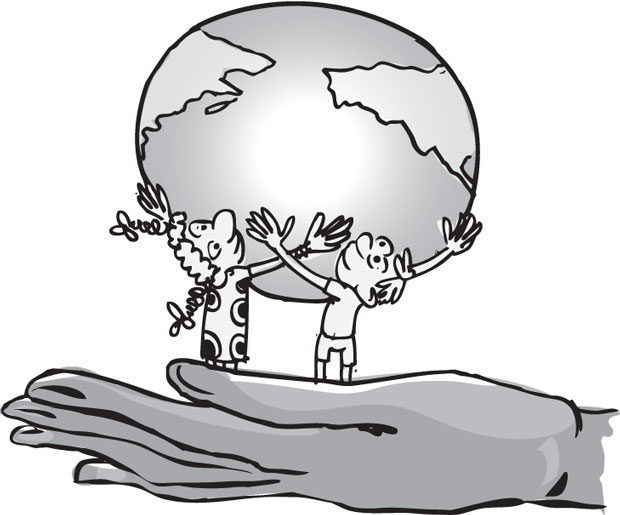Reply To:
Name - Reply Comment
Last Updated : 2024-04-16 15:17:00

World religious leaders have told us that anyone who causes damage to a child’s life should be thrown into the deepest ocean with a millstone tied around the neck -- symbolically showing the seriousness of the crime committed and the severity of the punishment.
It is with such reflections in mind that Sri Lanka celebrates World Children’s Day tomorrow in a modern digital era where many children carry in their pockets smart phones that give them access to world knowledge but also if used in a negative manner could cause enormous physical and mental damage to the children. In that event it is the smart phone that will have to be thrown into the deepest ocean.
The national government has announced that in the coming year there will be a gradual transformation in schools so that we will have e-classes. On Thursday Prime Minister Ranil Wickremesinghe visited such an e-class set up two years ago at the Sri Jayawardenapura University in Kotte and saw how computers and other hi-tech teaching equipment were being used.
Besides this digital revolution in education which we hope—that parents and other authorities will help the children to use largely in a positive manner there is also a need to set up green schools. This will make the children aware and interested in crucial international issues such as poverty alleviation and the life-or-death battle against climate change.
In Singapore for instance the green school concept is being worked out wonderfully. Some classes have no roof but work directly with solar energy with tents being ready in the event of rain. There are no fans and many of the classes have recycling bins where leftover food is turned into organic fertiliser. When such things are taught and practised in schools, the children grow up to be eco-friendly and responsible citizens caring about the well-being of others, global warming and other important issues instead of being enslaved in selfishness and self-centredness which ultimately damage their character and those with whom they
have relationships.
With the widespread use of digital technology the crime rate also is increasing with some notorious criminals knowing to be using the Facebook, other social media and smartphone technology to coordinate their crimes from jail. Of course bribery and corruption also play their part with some prison officers getting rich. Tragically the main victims of this sophisticated crime appear to be children. The National Child Protection Authority (NCPA), the Police Women’s and Children’s Bureau and other authorities need to play a much more effective role in protecting the children from hi-tech criminals.
Another tragic feature is that children are among the main victims of the growing number of road accidents. On Thursday there was a collision between a tipper and a three-wheeler in which as many as 13 schoolchildren were being transported back from school. The tragedy occurred at Walahena in Elpitiya and nine of the children are reported to be in a critical condition.
This week in Jaffna, a three-member High Court bench sentenced to death seven men who raped and murdered schoolgirl Sivaloganathan Vidya and to make it more sordid made a video film of the sadism and devilry. Another major issue that needs to be tackled effectively is the sexual abuse of children in school vans and public transport vehicles.
Anthropologist Margaret Mead has said children must be taught how to think, not what to think.
Russian novelist Fyodor Dostoyevsky has reminded us that the soul is healed by being
with children.
Afghanistan’s Goodwill Envoy Khaled Hosseini has also told us that children are not colouring books. We cannot fill them with our favourite colours.
These are words of wisdom we need to remember and practise if World Children’s Day is to go beyond words.
MP Saturday, 30 September 2017 03:28 PM
NOT ONLY WORLD'S CHILDREN DAY, BUT FOR EVERYTHING THIS RULE SHOULD APPLY.BUT OUR POLITICIANS' WORDS ARE LIMITED TO THAT MOMENT ITSELF. BEYOND THAT NOTHING HAPPENS.

Add comment
Comments will be edited (grammar, spelling and slang) and authorized at the discretion of Daily Mirror online. The website also has the right not to publish selected comments.
Reply To:
Name - Reply Comment
On March 26, a couple arriving from Thailand was arrested with 88 live animal
According to villagers from Naula-Moragolla out of 105 families 80 can afford
Is the situation in Sri Lanka so grim that locals harbour hope that they coul
A recent post on social media revealed that three purple-faced langurs near t
09 Apr 2024 - 1 - 1168

10 Apr 2024
09 Apr 2024